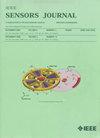基于电容式传感器的芥菜油掺假快速检测装置的研制
IF 4.3
2区 综合性期刊
Q1 ENGINEERING, ELECTRICAL & ELECTRONIC
引用次数: 0
摘要
食用油掺假是当今最严重的食品安全问题之一。芥末油(MO)中掺入argemone油(AO)的情况很普遍,因此对消费者造成了严重的健康问题。常见的检测食用油掺假的方法既耗时又以实验室为导向。针对上述问题,研制了一种基于芥菜和AO介电特性的便携式快速掺假检测仪器。所开发的电容传感器系统被校准以记录电容及其在MO与AO掺入程度方面的变化。硬件部分由微控制器、温度传感器、晶振、电阻器、电感、电容、发光二极管等组成;在后台有一个基于c++的软件,它可以根据预定义的阈值电容驱动LED闪烁。60秒闪烁的次数表示给定油样中掺假的程度。所开发的电容式传感器对AO掺入5%或以上的MO样品的准确度为86.7%。本文章由计算机程序翻译,如有差异,请以英文原文为准。
Development of a Capacitive Sensor-Based Device for Rapid Assessment of Adulteration in Mustard Oil
Adulteration of edible oils is amongst the most ominous food safety issues of the present times. Prevalence of mustard oil (MO) being adulterated with argemone oil (AO) is common, consequent upon which are the serious health issues for consumers. Common approaches to detect adulteration in edible oil are time consuming and laboratory oriented. Conceding to the abovesaid issues, a portable instrument for rapid assessment of adulteration has been developed based on the dielectric properties of mustard and AO. The developed capacitive sensor system is calibrated to record the capacitance and its variance in terms of the extent of adulteration of MO with AO. While the hardware assembly comprised – micro controller, temperature sensor, crystal oscillator, resistors, inductors, capacitors, light emitting diode (LED), etc.; there was a C++-based software at the backend which actuated the LED to blink based on a predefined threshold capacitance. The number of blinks in 60 s indicated the extent of adulteration in a given oil sample. The developed capacitive sensor demonstrated an accuracy of 86.7% for the MO samples with an AO adulteration of 5% or above.
求助全文
通过发布文献求助,成功后即可免费获取论文全文。
去求助
来源期刊

IEEE Sensors Journal
工程技术-工程:电子与电气
CiteScore
7.70
自引率
14.00%
发文量
2058
审稿时长
5.2 months
期刊介绍:
The fields of interest of the IEEE Sensors Journal are the theory, design , fabrication, manufacturing and applications of devices for sensing and transducing physical, chemical and biological phenomena, with emphasis on the electronics and physics aspect of sensors and integrated sensors-actuators. IEEE Sensors Journal deals with the following:
-Sensor Phenomenology, Modelling, and Evaluation
-Sensor Materials, Processing, and Fabrication
-Chemical and Gas Sensors
-Microfluidics and Biosensors
-Optical Sensors
-Physical Sensors: Temperature, Mechanical, Magnetic, and others
-Acoustic and Ultrasonic Sensors
-Sensor Packaging
-Sensor Networks
-Sensor Applications
-Sensor Systems: Signals, Processing, and Interfaces
-Actuators and Sensor Power Systems
-Sensor Signal Processing for high precision and stability (amplification, filtering, linearization, modulation/demodulation) and under harsh conditions (EMC, radiation, humidity, temperature); energy consumption/harvesting
-Sensor Data Processing (soft computing with sensor data, e.g., pattern recognition, machine learning, evolutionary computation; sensor data fusion, processing of wave e.g., electromagnetic and acoustic; and non-wave, e.g., chemical, gravity, particle, thermal, radiative and non-radiative sensor data, detection, estimation and classification based on sensor data)
-Sensors in Industrial Practice
 求助内容:
求助内容: 应助结果提醒方式:
应助结果提醒方式:


